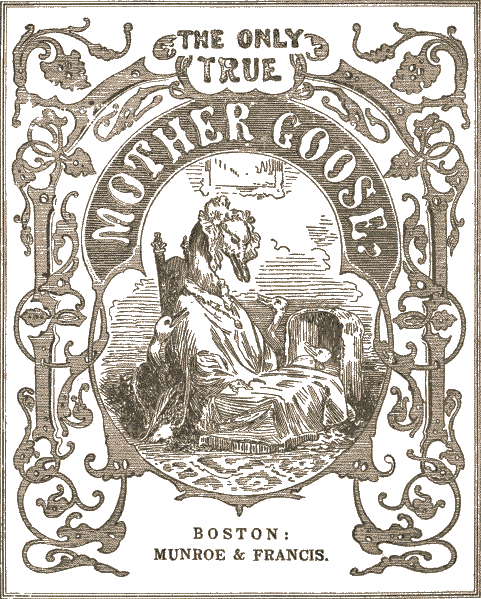
GOOSE’S MELODIES.
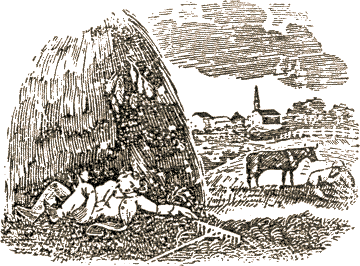
|
|
Little boy blue, come blow your horn, The sheep’s in the meadow, the cow’s in the corn, What! is this the way you mind your sheep, Under the haycock fast asleep? |
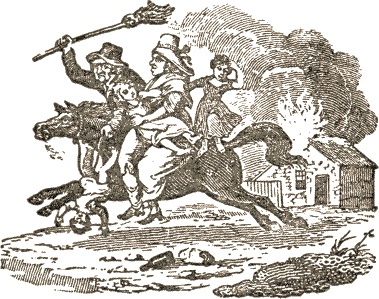
|
|
And he had a mad wife, And they lived all in a mad lane! They had three children all at a birth, And they too were mad every one. The father was mad, The mother was mad, The children all mad beside; And upon a mad horse they all of them got, And madly away did ride. |
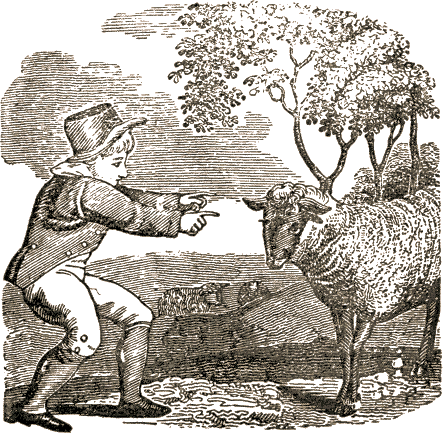
|
|
Baa, baa, black sheep, have you any wool? Yes, marry have I, three bags full, One for my master, and one for my dame, And one for the little boy that lives in the lane. |
![]()
To market, to market, to buy a penny bun,
Home again, home again, market is done.
![]()
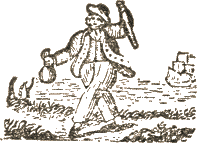
|
Asked me, How many strawberries Grew in the sea? I answered him as I thought good, As many red herrings As grew in the wood. |
![]()
|
Sat upon a tree, Up went the Pussy-Cat, And down went he; Down came Pussy-Cat, Away Robin ran, Says little Robin Redbreast— Catch me if you can. |
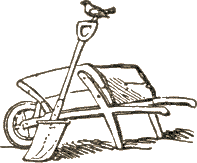
|
|
Little Robin Redbreast jumped upon a spade, Pussy-Cat jumped after him, and then he was afraid. Little Robin chirped and sung, and what did pussy say? Pussy-Cat said Mew, mew mew,—and Robin flew away. |
|
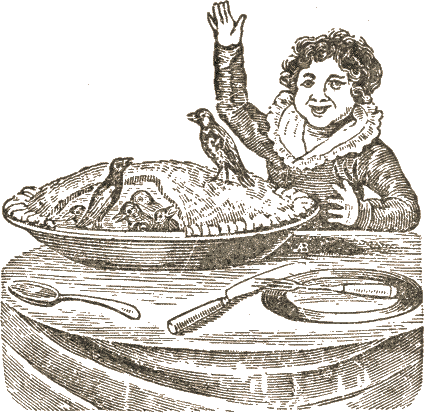
|
|
Sing a song of sixpence, a bag full of rye, Four and twenty blackbirds baked in a pie: When the pie was opened, the birds began to sing; And wasn’t this a dainty dish to set before the king? The king was in the parlour, counting out his money; The queen was in the kitchen, eating bread and honey; The maid was in the garden, hanging out the clothes, There came a little blackbird and nipt off her nose. |
![]()
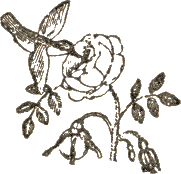
|
Fly away home, Your house is on fire, Your children will burn. |
![]()
|
Three, Four — open the door; Five, Six — pick up sticks; Seven, Eight — lay them straight; Nine, Ten — a good fat hen; Eleven, Twelve — I hope you’re well. Thirteen, Fourteen — draw the curtain; Fifteen, Sixteen — the maid’s in the kitchen; Seventeen, Eighteen — she’s in waiting. Nineteen, Twenty — my stomach’s empty. |
![]()
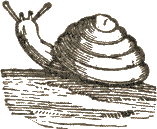
|
Come out of your hole, Or else I’ll beat you black as a coal. Snail, Snail, Put out your head, Or else I’ll beat you till you’re dead. |
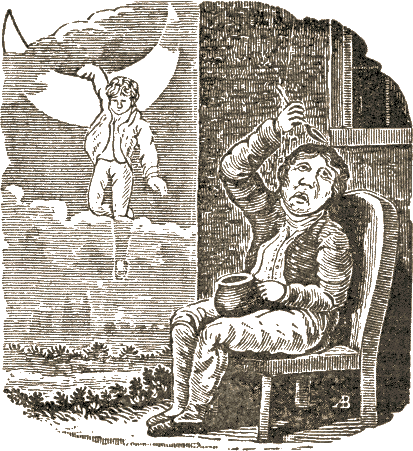
|
|
The man in the moon came down too soon To inquire the way to Norridge; The man in the south, he burnt his mouth With eating cold plum porridge. |
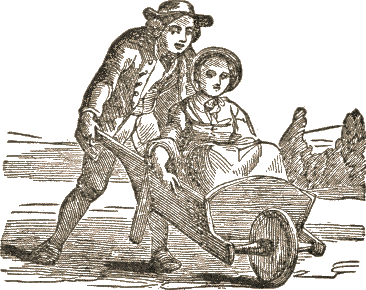
|
|
When I was a little boy, I lived by myself, And all the bread and cheese I got I put upon a shelf; The rats and the mice, they made such a strife, I was forced to go to London to buy me a wife. The streets were so broad, and the lanes were so narrow. I was forced to bring my wife home in a wheelbarrow; The wheelbarrow broke, and my wife had a fall, And down came the wheelbarrow, wife and all. |
![]()
Ate the pudding and left the bag.
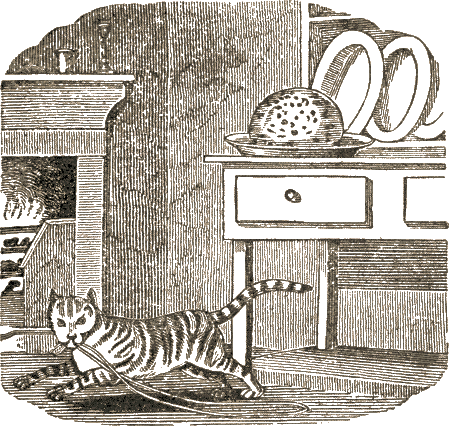
|
|
Sing, Sing! —— What shall I sing? The Cat’s run away with the Pudding-Bag String. |
![]()
When I was a little boy, I washed my mammy’s dishes,
Now I am a great boy I roll in golden riches.
![]()
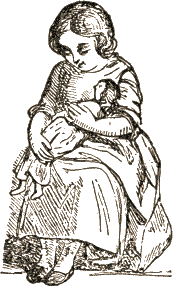
|
Father’s gone a hunting, Mother’s gone a milking, Sister’s gone a silking, And Brother’s gone to buy a skin, To wrap the Baby bunting in. |
’Twas once upon a time, when Jenny Wren was young,
So daintily she danced and so prettily she sung,
Robin Redbreast lost his heart, for he was a gallant bird;
So he doffed his hat to Jenny Wren, requesting to be heard.
O, dearest Jenny Wren, if you will but be mine,
You shall feed on cherry-pie and drink new currant wine,
I’ll dress you like a goldfinch or any peacock gay;
So, dearest Jen, if you’ll be mine, let us appoint the day.
Jenny blushed behind her fan and thus declared her mind:
Since, dearest Bob, I love you well, I take your offer kind;
Cherry-pie is very nice and so is currant wine,
But I must wear my plain brown gown and never go too fine.
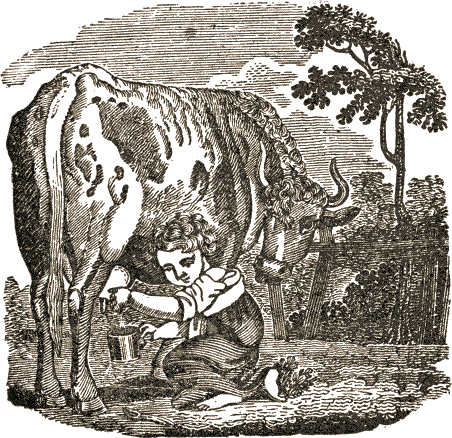
|
|
Cushy Cow bonny, let down your milk, And I will give you a gown of silk, A gown of silk and a silver tee, If you’ll let down your milk to me. |
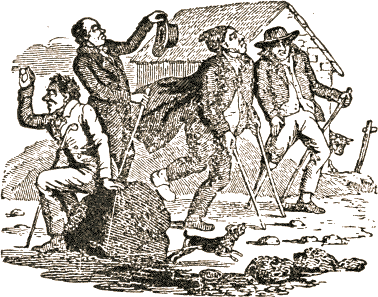
|
|
There were two blind men went to see Two cripples run a race, The bull did fight the humblebee And scratched him in the face. |
![]()
I smell the blood of an Englishman.
Be he live or be he dead,
I’ll grind his bones to make me bread.
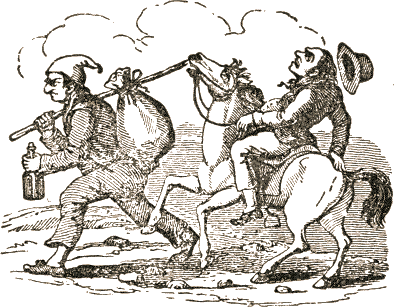
|
|
Richard and Robin were two pretty men; They laid abed till the clock struck ten; Robin starts up and looks at the sky, Oh ho! brother Richard, the sun’s very high, Do you go before with the bottle and bag, And I’ll follow after on little Jack Nag. |
![]()
|
Gooseberry Pie, My father loves good ale, And so do I. |

|
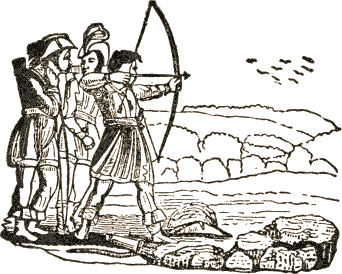
We’ll go to the wood, says Richard to Robin,
We’ll go to the wood, says Robin to Bobin,
We’ll go to the wood, says John all alone,
We’ll go to the wood, says every one.
What to do there? says Richard to Robin,
What to do there? says Robin to Bobin,
What to do there? says John all alone,
What to do there? says every one.
We’ll shoot at a wren, says Richard to Robin,
We’ll shoot at a wren, says Robin to Bobin,
We’ll shoot at a wren, says John all alone,
We’ll shoot at a wren, says every one.
Then pounce, then pounce, says Richard to Robin,
Then pounce, then pounce, says Robin to Bobin,
25Then pounce, then pounce, says John all alone,
Then pounce, then pounce, says every one.
She’s dead, she’s dead, says Richard to Robin,
She’s dead, she’s dead, says Robin to Bobin,
She’s dead, she’s dead, says John all alone,
She’s dead, she’s dead, says every one.
How get her home? says Richard to Robin,
How get her home? says Robin to Bobin,
How get her home? says John all alone,
How get her home? says every one.
In a cart and six horses, says Richard to Robin,
In a cart and six horses, says Robin to Bobin,
In a cart and six horses, says John all alone,
In a cart and six horses, says every one.
How shall we dress her? says Richard to Robin,
How shall we dress her? says Robin to Bobin,
How shall we dress her? says John all alone,
How shall we dress her? says every one.
We’ll hire seven cooks, says Richard to Robin,
We’ll hire seven cooks, says Robin to Bobin,
We’ll hire seven cooks, says John all alone,
We’ll hire seven cooks, says every one.
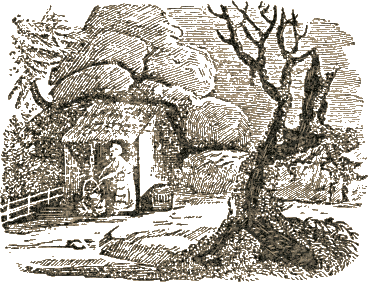
|
|
There was an old woman lived under the hill, And if she’s not gone she lives there still. Baked apples she sold, and cranberry pies, And she’s the old woman that never told lies. |
![]()
|
Shoe the colt, Shoe the wild mare; Here a nail, There a nail, Colt must go bare. |
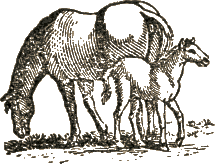
|
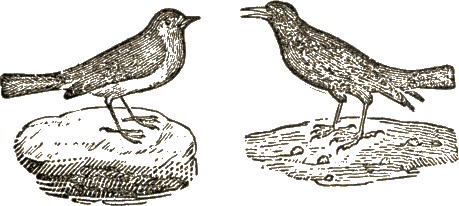
|
|
There were two birds sat upon a stone, Fal de ral — al de ral — laddy. One flew away, and then there was one, Fal de ral — al de ral — laddy. The other flew after, and then there was none, Fal de ral — al de ral — laddy. So the poor stone was left all alone, Fal de ral — al de ral — laddy. One of these little birds back again flew, Fal de ral — al de ral — laddy. The other came after, and then there were two, Fal de ral — al de ral — laddy. Says one to the other, Pray how do you do, Fal de ral — al de ral — laddy. Very well, thank you, and pray how are you, Fal de ral — al de ral — laddy. |
![]()
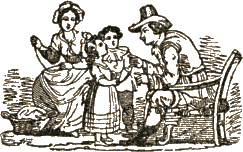
|
About Mary Morey, And now my story’s begun. I’ll tell you another About her brother, And now my story’s done. |
![]()
|
And what gave you that jolly red Nose? Nutmegs and cinnamon, spices and cloves, And they gave me this jolly red Nose. |
![]()
|
Chimney sweep, From the bottom to the top, Sweep all up, Chimney sweep, From the bottom to the top. Climb by rope, Or climb by ladder, Without either I’ll climb farther. |
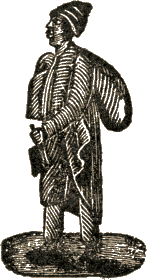
|
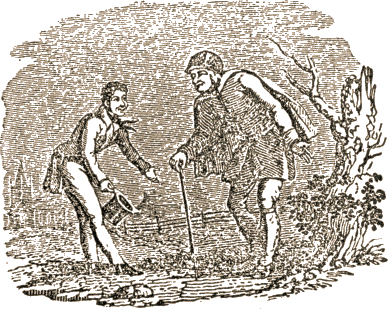
|
|
When cloudy was the weather, I chanced to meet an old man clothed all in leather. He began to compliment, and I began to grin, How do you do, and how do you do? And how do you do again? |
![]()
|
When the leaves ’gin to spring, Little lambs skip like fairies And birds build and sing. |
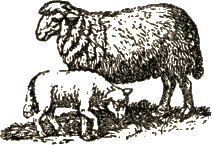
|
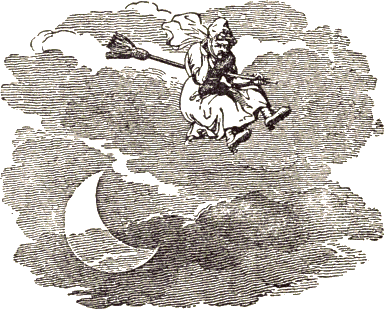
|
|
There was an old woman tost up in a blanket, Seventy times as high as the moon, What she did there, I cannot tell you, But in her hand she carried a broom. Old woman, old woman, old woman, said I, O whither, O whither, O whither so high? To sweep the cobwebs from the sky, And I shall be back again by and by. |
![]()
|
Shoe the horse, and shoe the mare, But let the little colt go bare. |

|
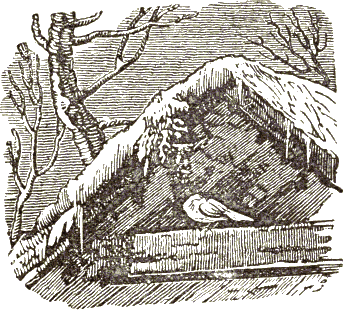
|
|
And we shall have snow, And what will poor robin do then? Poor thing! He’ll sit in the barn And keep himself warm, And hide his head under his wing. Poor thing! |
![]()
Cold and raw the north winds blow
Bleak in the morning early,
All the hills are covered with snow,
And winter’s now come fairly.
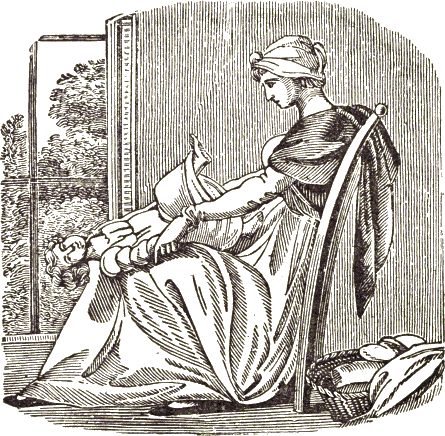
|
|
And hey my kitten my deary, Such a sweet pet as this Was neither far nor neary. Here we go up, up, up, And here we go down, down, downy, 33Here we go backward and forward, And here we go round, round, roundy. Where was a jewel and pretty, Where was a sugar and spicey? Hush a bye babe in the cradle, And we’ll go abroad in a tricey. Did his papa torment it? And vex his own baby will he? Give me a hand and I’ll beat him, With your red coral and whistle. Here we go up, up, up, And here we go down, down, downy, And here we go backward and forward, And here we go round, round, roundy. |
![]()
|
And the grey Kits’ mother, All went over The bridge together. The bridge broke down. They all fell in, May the rats go with you, Says Tom Bolin. |
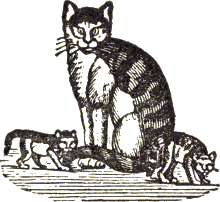
|
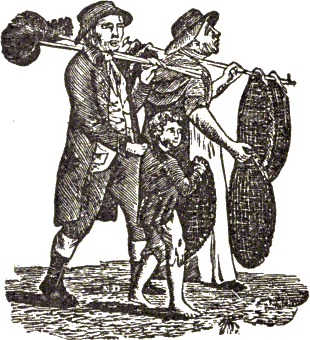
|
|
The beggars have come to town; Some in rags, and some in tags, And some in velvet gowns. |
![]()
|
Diddle diddle dumpling, my son John Went to bed with his breeches on, One stocking off, and one stocking on, Diddle diddle dumpling, my son John. |
![]()
As I was going to Derby upon a market day,
I met the finest ram, sir, that ever fed on hay,
On hay, on hay, on hay,
I met the finest ram, sir, that ever fed on hay.
This ram was fat behind, sir; this ram was fat before;
This ram was ten yards round, sir; indeed he was no more.
No more, no more, no more;
This ram was ten yards round, sir; indeed he was no more.
The horns grew on his head, sir, they were so wondrous high,
As I’ve been plainly told, sir, they reached up to the sky.
The sky, the sky, the sky,
As I’ve been plainly told, sir, they reached up to the sky.
The tail grew on his back, sir, was six yards and an ell,
And it was sent to Derby to toll the market bell,
The bell, the bell. the bell,
And it was sent to Derby to toll the market bell.
![]()
|
Hogs in the garden, catch ’em, Towser; Cows in the corn-field, run boys, run, Cats in the cream-pot, run girls, run girls; Fire on the mountains, run boys, run. |
![]()
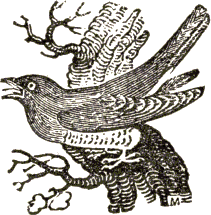
|
She sings as she flies, She brings us good tidings, And tells us no lies. She sucks little bird’s eggs To make her voice clear, And never cries Cuckoo! Till Spring of the year. |
Lavender blue, and Rosemary green,
When I am king, you shall be queen,
Call up my maids at four of the clock,
Some to the wheel, and some to the rock,
Some to make hay, and some to shell corn,
And you and I shall keep the bed warm.
|
Were fighting for the crown — The lion beat the unicorn All about the town. Some gave them white bread, And some gave them brown, Some gave them plum-cake, And sent them out of town. |
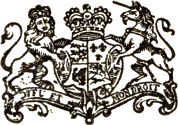
|
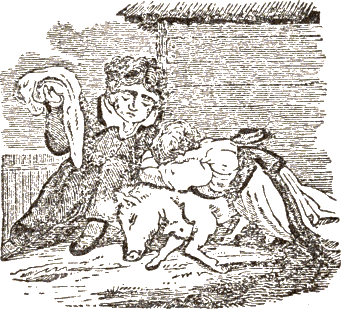
|
|
Little Johnny Pringle had a little Pig. It was very little, so was not very big. As it was playing beneath the shed, In half a minute poor Piggy was dead. So Johnny Pringle he sat down and cried, And Betty Pringle she laid down and died. There is the history of one, two and three, Johnny Pringle, Betty Pringle, and Piggy Wiggie. |
![]()
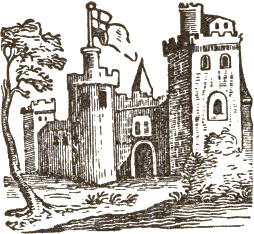
|
Say the bells of St. Helen’s. When will you pay me? Say the bells of Old Bailey. When I grow rich, Say the bells of Shoreditch. When will that be? Say the bells of Stepney. I do not know, Says the great Bell of Bow. |
|
Ring the bells of Whitechapel. Halfpence and farthings, Say the bells of St. Martin’s. Kettles and pans, Say the bells of St. Ann’s. Brickbats and tiles, Say the bells of St. Giles. Old shoes and slippers, Say the bells of St. Peter’s. Pokers and tongs, Say the bells of St. John’s. |
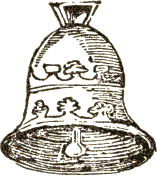
|
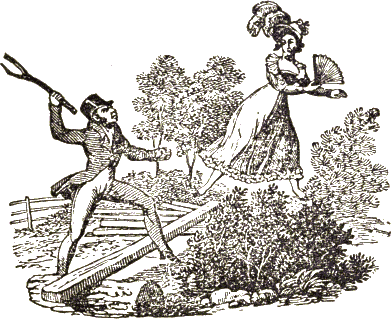
|
|
Once in my life I married a wife, And where do you think I found her? On Gretna Green, in velvet sheen, And I took up a stick to pound her. She jumped over a barberry-bush, And I jumped over a timber, I showed her a gay gold ring, And she showed me her finger. |
![]()
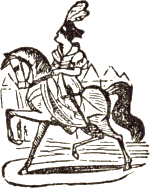
|
Ride a cock horse to Charing-Cross, To see a young woman Jump on a white horse, With rings on her fingers And bells on her toes, And she shall have music Wherever she goes. |
![]()
|
Johnny shall have a new bonnet, And Johnny shall go to the fair, And Johnny shall have a new ribbon To tie up his bonny brown hair. And why may not I love Johnny, And why may not Johnny love me? And why may not I love Johnny As well as another body? And here’s a leg for a stocking, And here’s a foot for a shoe, And he has a kiss for daddy, And two for his mammy also. And why may not I love Johnny? And why, &c. &c. |
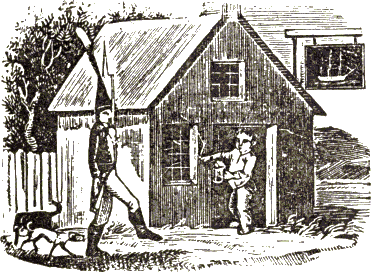
|
|
What do you want? A pot of beer. Where’s your money? I forgot. Got you gone, you drunken sot. |
![]()
|
Come and buy my little toys, Monkeys made of gingerbread And sugar horses painted red. |
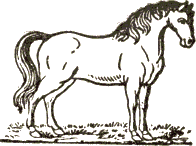
|
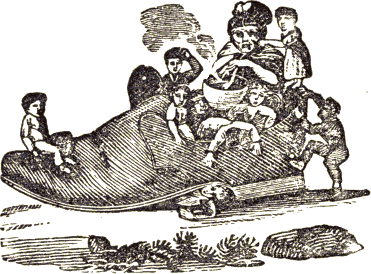
|
|
There was an old woman, she liv’d in a shoe, She had so many children she didn’t know what to do. She gave them some broth without any bread, She whipt them all soundly and put them to bed. |
![]()
Heigh ding a ding, what shall I sing?
How many holes in a skimmer?
Four and twenty. I’m half starving!
Mother, pray give me some dinner.
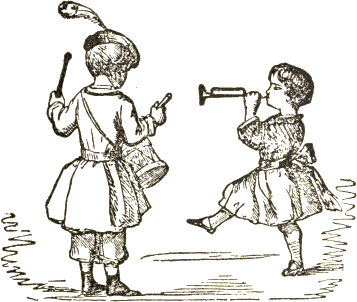
|
|
Hey rub-a-dub, ho rub-a-dub, three maids in a tub, And who do you think was there? The butcher, the baker, the candlestick-maker, And all of them gone to the fair. |
![]()
|
To be sung in a high wind. Arthur O’Bower has broken his band, And he comes roaring up the land, King of Scots with all his power Never can turn Sir Arthur O’Bower. |
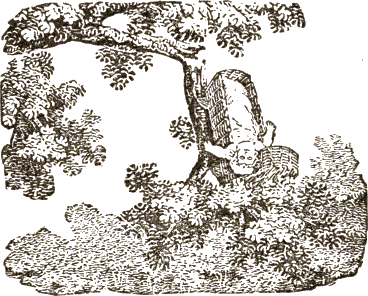
|
|
Hush-a-bye, baby, upon the tree top, When the wind blows the cradle will rock; When the bough breaks the cradle will fall, Down tumble cradle and baby and all. |
![]()
Daffy-down-dilly is new come to town,
With a petticoat green, and a bright yellow gown,
And her white blossoms are peeping around.
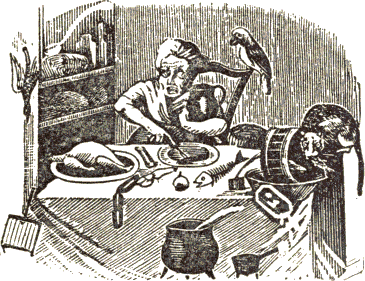
|
|
There was an old woman, and what do you think? She liv’d upon nothing — but victuals and drink: Victuals and drink were the chief of her diet, And yet this old lady scarce ever was quiet. |
![]()
The rose is red, the violet blue,
The gillyflower sweet — and so are you.
These are the words you bade me say
For a pair of new gloves on Easter-day.
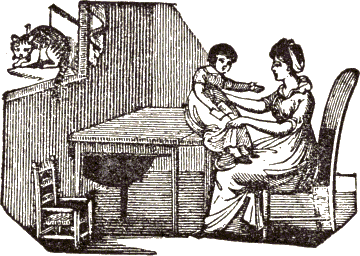
|
|
Great A, little a, bouncing B, The Cat’s in the Cupboard, and she can’t see. |
![]()
|
The little black dog ran round the house, And set the bull a roaring, And drove the monkey in the boat, Who set the oars a rowing, And scared the cock upon the rock, Who cracked his throat with crowing. |

|
![]()
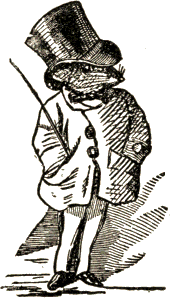
|
Oh, what a sweet little white Mouse! Oh, what a dear little bright Mouse! With his eyes of pink, Going winky-wink, Oh, what a sweet little white Mouse.
I suppose you think, I cannot do without you, I’ll let you know Before I go, How little I care about you. |
![]()
Tell tale tit, your tongue shall be slit,
And all the dogs in our town shall have a bit.
![]()
Saturday night shall be my whole care
To powder my locks and curl my hair;
On Sunday morning my love will come in
And marry me then with a pretty gold ring.
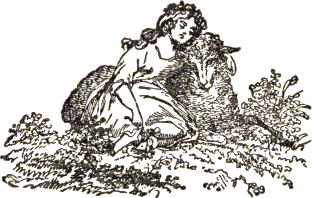
|
|
I heard a little lamb cry, baa! Says I, “So you have lost mamma?” “Ah!” The little lamb, as I said so, Frisking about the fields did go, And, frisking, trod upon my toe. “Oh!” |
![]()
Pease porridge hot, pease porridge cold,
Pease porridge in the pot nine days old.
Can you spell that with four letters?
Yes, I can — T H A T.
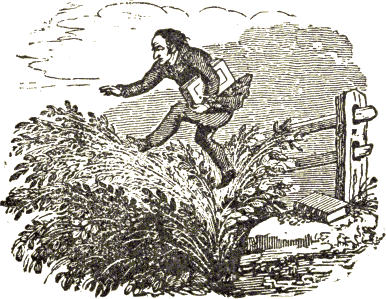
|
|
And he was wond’rous wise, He jump’d into a bramble-bush, And scratch’d out both his eyes; And when he saw his eyes were out, With all his might and main He jump’d into another bush, And scratch’d them in again. |
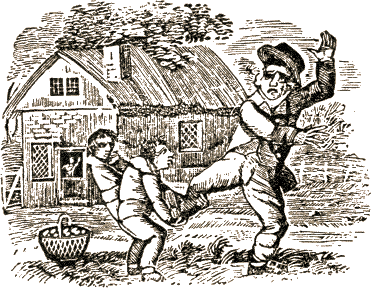
|
|
As I was going to sell my eggs, I met a thief with bandy legs, Bandy legs and crooked toes, I tript up his heels and he fell on his nose. |
![]()
|
Lived in a coal-scuttle, Along with her dog and her cat; What they ate I can’t tell, But ’tis known very well, That none of the party were fat. |
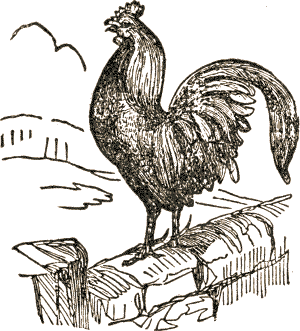
|
|
| Hen. |
I’ve laid an egg, Am I to gang ba-are-foot? |
| Cock. |
Hen, hen, hen, hen, I’ve been up and down, To every shop in town, And cannot find a shoe To fit your foot, If I’d crow my hea-art out. |
[To be said very quickly, except the last two words in each verse, which are to be “screamed” out.]
52
![]()
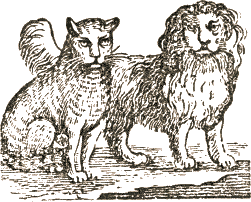
|
How can she be fair? Then comes in the little dog, Pussy, are you there? So, so, dear mistress Pussy, Pray tell me how you do? I thank you, little dog, I’m very well just now. |
![]()
|
How many days has my baby to play? Saturday, Sunday, Monday, Tuesday, Wednesday, Thursday, Friday, Saturday, Sunday, Monday. |
![]()
|
Baker’s man! So I do, master, as fast as I can. Pat it, and prick it, And mark it with T. And then it will serve For Tommy and me. |
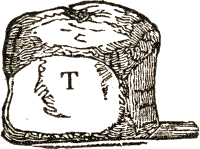
|
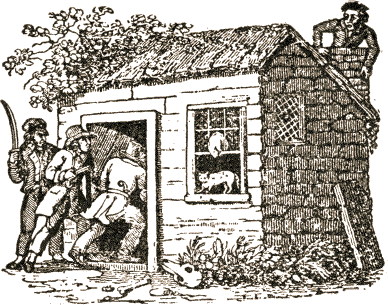
|
|
There was a man and he had naught, And robbers came to rob him; He crept up to the chimney top, And then they thought they had him. But he got down on t’other side, And then they could not find him: He ran fourteen miles in fifteen days, And never look’d behind him. |
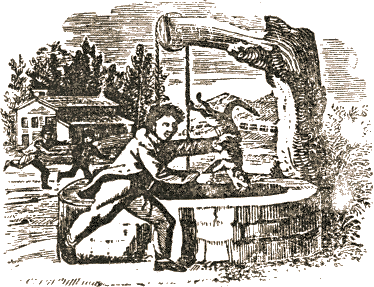
|
|
Ding——dong——bell, the cat’s in the well, Who put her in? little Johnny Green. Who pulled her out? great Johnny Stout. What a naughty boy was that, To drown poor pussy cat; Who never did him any harm, And killed the mice in his father’s barn. |
![]()
Stole his father’s gouty shoe.
The worst of harm that dad can wish him,
Is his gouty shoe may fit him.
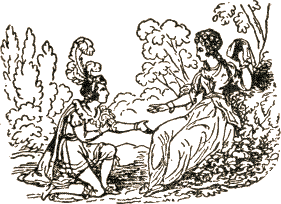
|
|
Will you be mine? You shall neither wash dishes Nor serve the wine, But sit on a cushion and sew up a seam, And you shall have strawberries, sugar and cream. |
![]()
|
I won’t be my father’s Jill, I will be the fiddler’s wife, And have music when I will. T’other little tune, t’other little tune, Prythee, love, play me t’other little tune. |
![]()
LONDON BRIDGE. |
|
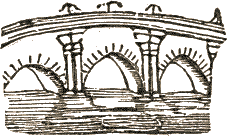
|
Dance over my Lady Lee, London bridge is broken down, With a gay ladye. How shall we build it up again? Dance over my Lady Lee, How shall we build it up again? With a gay ladye. |
|
We’ll build it up with gravel and stone, Dance over my Lady Lee, We’ll build it up with gravel and stone, With a gay ladye. Gravel and stone will be washed away, Dance over my Lady Lee, Gravel and stone will be washed away, With a gay ladye. We’ll build it up with iron and steel, Dance over my Lady Lee, We’ll build it up with iron and steel, With a gay ladye. 57Iron and steel will bend and break, Dance over my Lady Lee, Iron and steel will bend and break, With a gay ladye. We’ll build it up with silver and gold, Dance over my Lady Lee, We’ll build it up with silver and gold, With a gay ladye. Silver and gold will be stolen away, Dance over my Lady Lee, Silver and gold will be stolen away, With a gay ladye. We’ll set a man to watch it then, Dance over my Lady Lee, We’ll set a man to watch it then, With a gay ladye. Suppose the man should fall asleep, Dance over my Lady Lee, Suppose the man should fall asleep, With a gay ladye. We’ll put a pipe into his mouth, Dance over my Lady Lee, We’ll put a pipe into his mouth, With a gay ladye. |
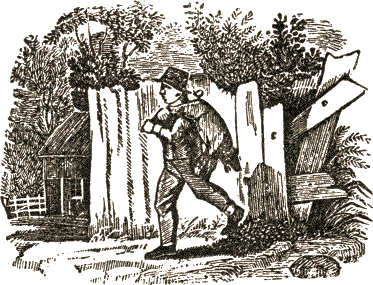
|
|
Stole a pig, and away he run; The pig was eat, And Tom was beat, And Tom ran crying down the street. |
![]()
Little king Boggen he built a fine hall,
Pie-crust and pastry-crust, that was the wall;
The windows were made of black-puddings and white,
And slated with pancakes — you ne’er saw the like.
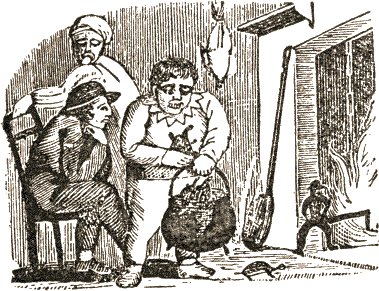
|
|
To bed, to bed, says Sleepy-Head; Let’s stay awhile, says Slow; Put on the pot, says Greedy-Sot, We’ll sup before we go. |
![]()
Dingty diddledy, my mammy’s maid,
She stole oranges, I am afraid:
Some in her pocket, some in her sleeve,
She stole oranges, I do believe.
![]()
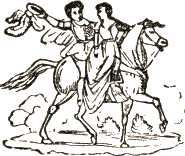
|
Johnny shall ride, And he shall have pussy-cat Tied to one side; And he shall have little dog Tied to the other, And Johnny shall ride To see his grandmother. |
![]()
Hush-a-bye, baby, lie still with thy daddy,
Thy mammy is gone to the mill,
To get some meal to bake a cake;
So pray, my dear baby, lie still.
![]()
|
Where were you born? Far off in Lancashire, under a thorn, Where they sup butter-milk With a ram’s horn; And a pumpkin scoop’d, With a yellow rim, Is the bonny bowl they breakfast in. |
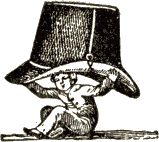
|
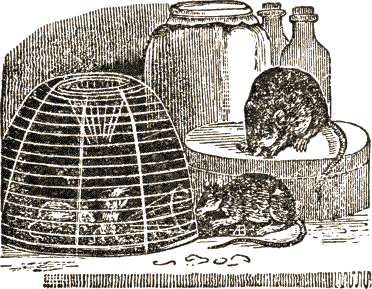
|
|
We are troubled with rats, Will you drive them out of the house? We have mice too in plenty, That feast in the pantry, But let them stay and nibble away, What harm in a little brown mouse? |
![]()
Shake a leg, wag a leg, when will you gang?
At midsummer, mother, when the days are lang.
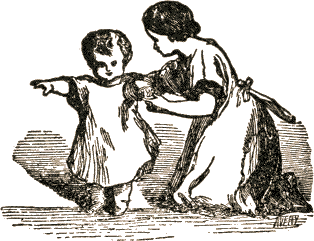
|
|
See saw, sacradown, sacradown, Which is the way to Boston town? One foot up, the other foot down. That is the way to Boston town. |
![]()
|
Tom Brown’s two little Indian boys, One ran away, The other wouldn’t stay, Tom Brown’s two little Indian boys. |
![]()
Hop away, skip away, my baby wants to play.
My baby wants to play every day.
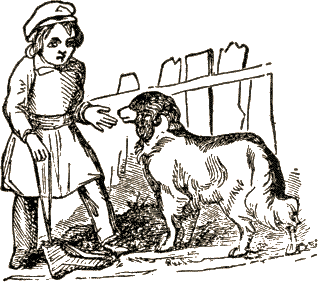
|
|
Bow, wow, wow, whose dog are thou? Little Tom Tinker’s dog, bow, wow, wow. |
![]()
Silver buckles on his knee;
He’ll come back and marry me,
Pretty Bobby Shaftoe.
Bobby Shaftoe’s fat and fair,
Combing down his yellow hair,
He’s my love forevermore,
Pretty Bobby Shaftoe.
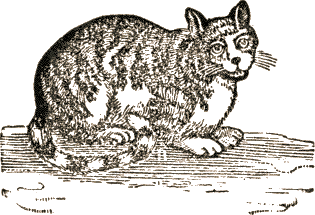
|
|
Pussy cat, pussy cat, where have you been? I’ve been to London to see the Queen. Pussy cat, pussy cat, what did you there? I frightened a little mouse under the chair. |
![]()
Taffy was a Welchman, Taffy was a thief,
Taffy came to my house and stole a piece of beef;
I went to Taffy’s house, Taffy wan’t at home,
Taffy came to my house and stole a marrow-bone;
I went to Taffy’s house, Taffy was in bed,
I took the marrow-bone, and beat about his head.
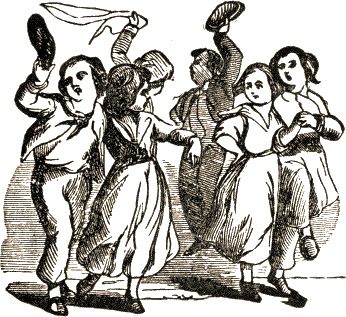
|
|
Boys and girls, come out to play, The moon does shine as bright as day, Leave your supper, and leave your sleep, And meet your playfellows in the street; Come with a whoop, and come with a call, And come with a good will, or not at all. Up the ladder and down the wall, A halfpenny roll will serve us all. You find milk and I’ll find flour, And we’ll have pudding in half an hour. |
![]()
|
Ride a cock horse to Banbury-cross To see what Tommy can buy; A penny white loaf, a penny white cake, And a two penny apple pie. |
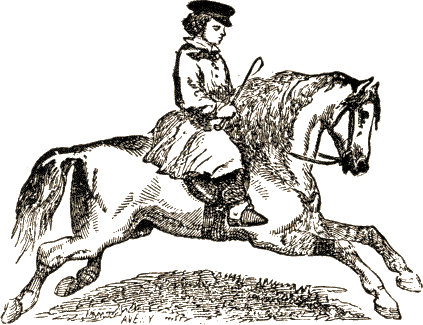
|
|
Ride a cock horse to Shrewsbury-cross, To buy little Johnny a galloping horse It trots behind and it ambles before, And Johnny shall ride till he can ride no more. |
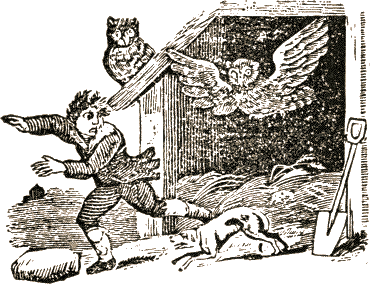
|
|
And made of a ted of straw his bed; An owl came out and flew about, And Jemmy Jed up stakes and fled. Wan’t Jemmy Jed a staring fool, Born in the woods to be scar’d by an owl? |
![]()
Threescore miles and ten.
Can I get there by candle-light?
Yes, and back again.
![]()
|
A little girl said, As she sprang like a lark From her low trundle bed. It is morning, bright morning, Good morning, Papa! Oh give me one kiss, For good morning, mamma! |
![]()
|
And dance upon dishes, My mother sent me for yeast, some yeast, She bid me tread lightly, And come again quickly, For fear the young men would play me some jest. Yet didn’t you see, yet didn’t you see, What naughty tricks they put upon me? They broke my pitcher, and spilt my water, And huff’d my mother, and chid her daughter, And kissed my sister instead of me. |
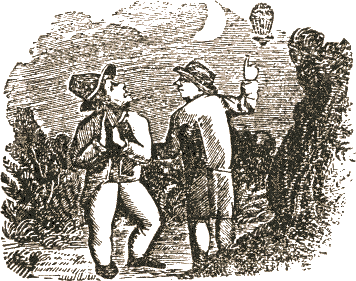
|
|
Good neighbour, I pray? They say the balloon Has gone up to the moon. |
![]()
There was an old man in a velvet coat,
He kiss’d a maid and gave her a groat;
The groat was crack’d and would not go.
Ah, old man, do you serve me so?
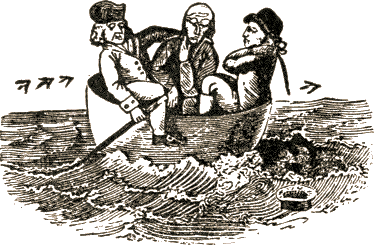
|
|
Went to sea in a bowl, And if the bowl had been stronger My song had been longer. |
![]()
|
And lay me down softly, And set me on a bank to dry, That I may look pretty, When some one comes by. |
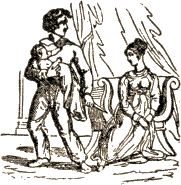
|
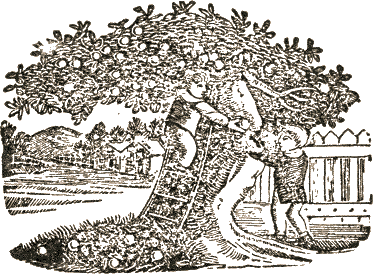
|
|
Up in the green orchard there is a green tree, The finest of pippins that ever you see; The apples are ripe, and ready to fall, And Reuben and Robin shall gather them all. |
![]()
Harry cum Parry, when will you marry?
When apples and pears are ripe,
I’ll come to your wedding without any bidding,
And stay with the bride all night.
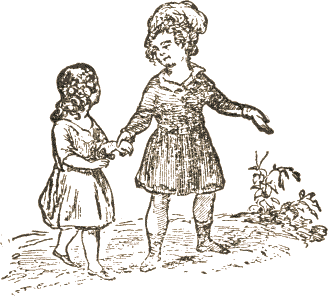
|
|
Jog on, jog on, the footpath way, And merrily jump the style, boys, A merry heart goes all the day, Your sad one tires in a mile, boys. |
![]()
|
Of the days that are long, Of the woodcock and the sparrow, Of the little dog that burnt his tail, And he shall be whipt to-morrow. |
![]()
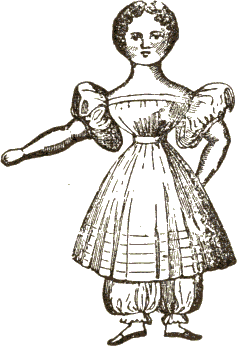
|
The prettiest ever seen, She washed me the dishes, And kept the house clean. She went to the mill To fetch me some flour, And always got it home In less than an hour; She baked me my bread, She brewed me my ale, She sat by the fire And told many a fine tale. |
![]()
|
My mother took me on her knee, Smiles and kisses gave with joy, And call’d me oft her darling boy. |
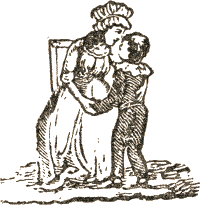
|
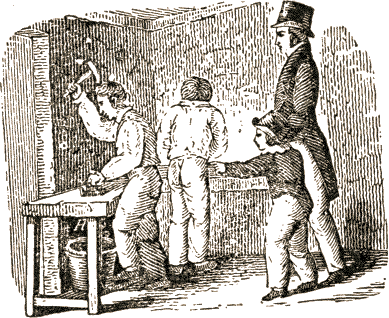
|
|
Is master Smith within? — Yes, that he is. Can he set a shoe? Ay, marry, two. Here a nail, and there a nail, Tick — tack — too. |
![]()
Charley loves good cake and ale,
Charley loves good candy,
Charley loves to kiss the girls,
When they are clean and handy.
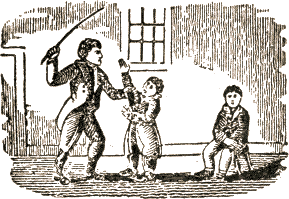
|
|
John O’Gudgeon he was a wild man, He whipt his children now and then, When he whipt them, he made them dance, Out of Ireland into France. |
![]()
|
Had a wife and couldn’t keep her; He put her in a pumpkin shell, And then he kept her very well. Peter, Peter, pumpkin eater, Had another and didn’t love her; Peter learnt to read and spell, And then he loved her very well. |
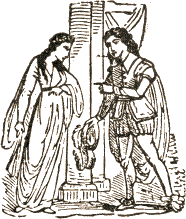
|
![]()
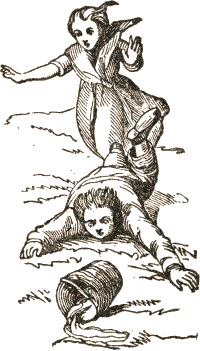
|
Jack and Jill went up the hill, To draw a pail of water; Jack fell down and broke his crown And Jill came tumbling after.
And he had a calf, And that’s half; He took him out of the stall, And put him on the wall, And that’s all. |
![]()
|
And he had a little gun, And his bullets were made of lead, He shot John Sprig Through the middle of his wig, And knocked it right off his head. |
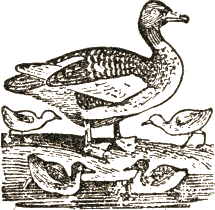
|
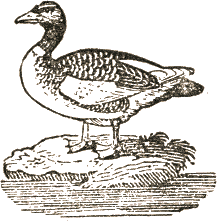
|
|
Goosey, goosey, gander, where dost thou wander? Up stairs and down stairs, and in my lady’s chamber; There I met an old man that would not say his prayers, I took him by his hind legs and threw him down stairs. |
|
![]()
|
That couldn’t speak plain, Cried, Gobble, gobble, gobble; The man on the hill, That couldn’t stand still, Went hobble, hobble, hobble. |
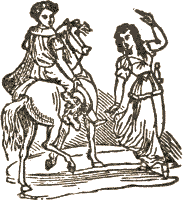
|
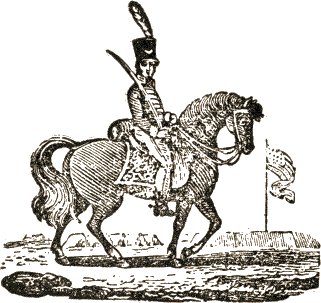
|
|
Can you shoe this horse of mine, So that I may cut a shine? Yes, good sir, and that I can, As well as any other man; There a nail, and here a prod, And now, good sir, your horse is shod. |
![]()
Hey ding a ding, ding, I heard a bird sing,
The parliament soldiers are gone to the king.
![]()
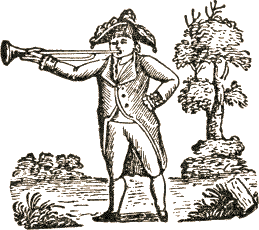
|
Pibroch of Donnel, Wake thy voice anew, Summon Clan-Connel. Come away, come away, Hark to the summons! Come in your war array, Gentles and commons! |
|
Come as the winds come, When forests are rended, Come as the waves come, When navies are stranded. Faster come, faster come, faster and faster, Chief, vassal, page and groom, Tenant and master. Fast they come, fast they come, See how they gather! Wide waves the eagle plume blended with heather. Cast your plaids, draw your blades, Forward each man set! Pibroch of Donnel Dhu, now for the onset! |
|
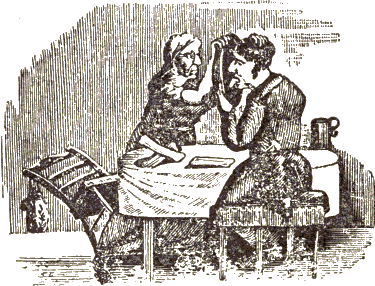
|
|
His wife could eat no lean; So ’twixt them both they cleared the cloth, And lick’d the platter clean. |
![]()
There was a little boy went into a barn,
And lay down on some hay;
A calf came out and smelt about,
And the little boy ran away.
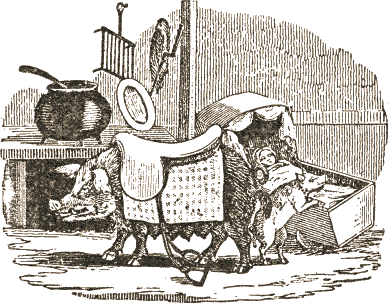
|
|
The sow came in with the saddle, The little pig rock’d the cradle, The dish jump’d up on the table To see the pot swallow the ladle. The spit that stood behind the door Threw the pudding-stick on the floor. Odsplut! said the gridiron, Can’t you agree? I’m the head constable, Bring them to me. |
![]()
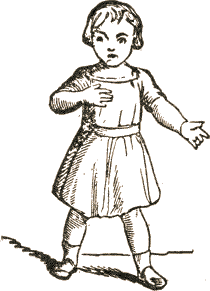
|
Sing for your supper: What shall I sing? White bread and butter. How shall I cut it Without any knife? How shall I marry Without any wife? |
![]()
I would, if I could; if I couldn’t, how could I?
I couldn’t without I could, could I?
Could you without you could, could ye? could ye? could ye?
You couldn’t without you could, could ye?
![]()
|
Oh that I were where I would be! Then should I be where I am not; But where I am, there I must be, And where I would be I can not. |
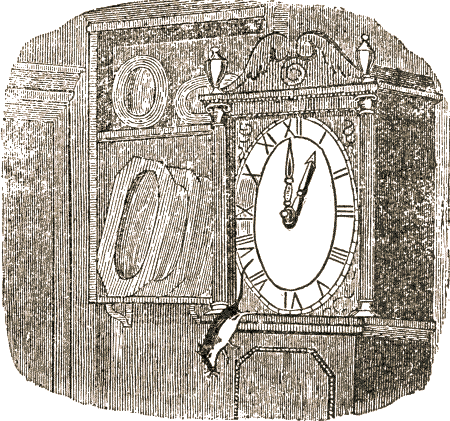
|
|
The mouse run up the clock; The clock struck one, and down he run, Hiccory, diccory, dock. |
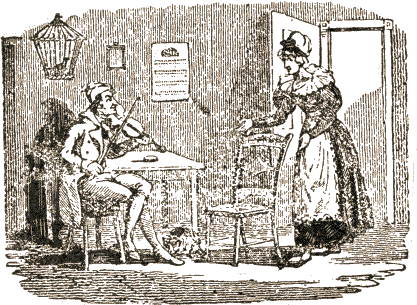
|
|
Jacky, come give me your fiddle, If ever you mean to thrive. Nay, I’ll not give my fiddle To any man alive. If I should give my fiddle, They’ll think that I’m gone mad, For many a joyful day My fiddle and I have had. |
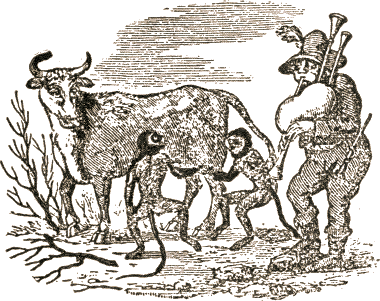
|
|
And he had naught to give her, He pull’d out his pipes and play’d her a tune, And bade the cow consider. The cow considered very well, And gave the piper a penny, And bade him play the other tune, “Corn rigs are bonny.” |
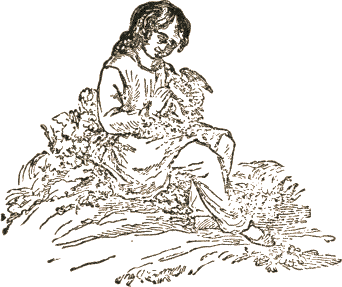
|
|
Away, pretty robin, fly home to your nest, To make you my captive I still should like best, And feed you with worms and with bread: Your eyes are so sparkling, your feathers so soft, Your little wings flutter so pretty aloft, And your breast is all cover’d with red. |
![]()
Loves plum-cake and sugar candy.
He bought some at a grocer’s shop,
And pleased away went hop, hop, hop.
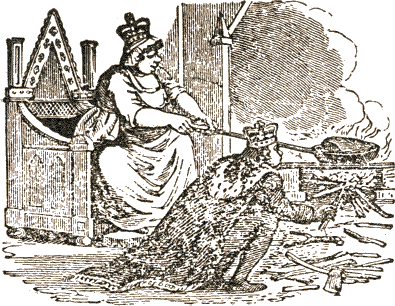
|
|
When good King Arthur ruled his land He was a goodly king; He stole three pecks of barley meal To make a bag-pudding. A bag-pudding the king did make, And stuff’d it well with plums; And in it put great lumps of fat, As big as my two thumbs. The king and queen did eat thereof, And noblemen beside; And what they could not eat that night, The queen next morning fried. |
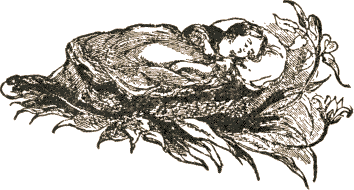
|
|
Rock-a-bye, baby, your cradle is green, Father’s a nobleman, mother’s a queen, And Betty’s a lady, and wears a gold ring, And Johnny’s a drummer, and drums for the king. |
![]()
Johnny shall have a new master;
Johnny shall have but a penny a day,
Because he can work no faster.
![]()
About the bush, Willie, about the bee-hive,
About the bush, Willie, I’ll meet thee alive.
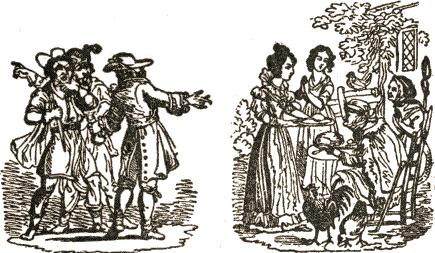
|
|
We’re three brethren out of Spain, Come to court your daughter Jane. My daughter Jane she is too young, She has no skill in a flattering tongue. Be she young or be she old, It’s for her gold she must be sold, So fare you well, my lady gay, We shall return another day. |
![]()
Mistress Mary, quite contrary,
How does your garden grow?
With silver bells and cockle shells,
And maidens all in a row.
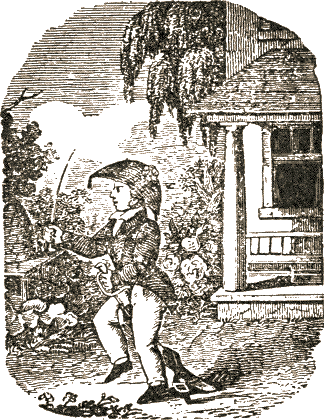
|
|
When I was a little boy, my mother kept me in, Now I am a great boy, and fit to serve the king; I can handle a musket, I can smoke a pipe, I can kiss a pretty girl at ten o’clock at night. |
![]()
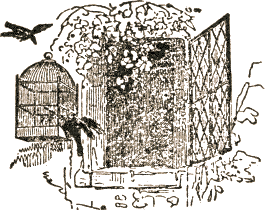
|
Feathers bright and yellow, Slender legs, upon my word He was a pretty fellow. |
|
The sweetest notes he always sung, Which much delighted Mary, And often where the cage was hung, She stood to hear Canary. |
|
![]()
This is the way the ladies ride,
Prim, prim, prim;
This is the way the gentlemen ride,
Trim, trim, trim.
Presently come the country-folks,
Hobbledy gee, hobbledy gee.
![]()
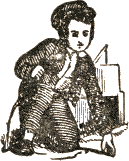
|
Two, Three, Four, Five, I caught a hare alive. |
Six, Seven, Eight, Nine, Ten, I let it go again. |
|
My dame has lost her shoe; My master’s lost his fiddlestick, And knows not what to do. |
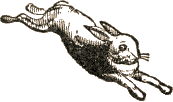
|
![]()
|
Married a wife on Sunday, Bro’t her home on Monday, Hired a house on Tuesday, Fed her well on Wednesday, Sick was she on Thursday, Dead was she on Friday, Sad was Tom on Saturday, To bury his wife on Sunday. |
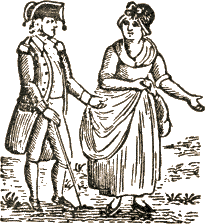
|
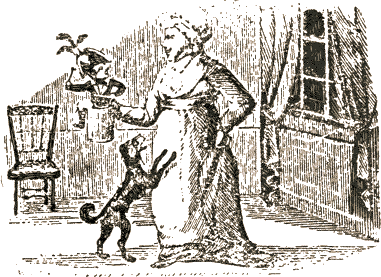
|
|
I had a little husband no bigger than my thumb, I put him in a pint pot, and there I bid him drum; I bought a little handkerchief to wipe his little nose, And a pair of little garters to tie his little hose. |
![]()
I met seven wives,
Every wife had seven sacks,
Every sack had seven cats,
Every cat had seven kits.
Kits, cats, sacks and wives,
How many were going to St. Ives?
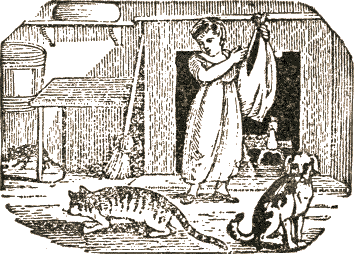
|
|
Miss Jane had a bag, and a mouse was in it, She opened the bag, he was out in a minute; The Cat saw him jump, and run under the table, And the dog said, catch him, puss, soon as you’re able. |
![]()
|
Sit by the fire and spin; Take a cup, and drink it up, Then call your neighbours in. |
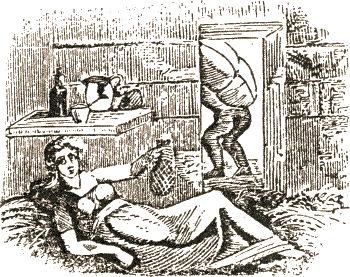
|
|
Sold her bed, and lay upon straw. Was not she a dirty slut, To sell her bed and lay in the dirt? |
![]()
Twenty pounds will marry me
If twenty won’t, forty shall,
I’m my mother’s bouncing girl.
![]()
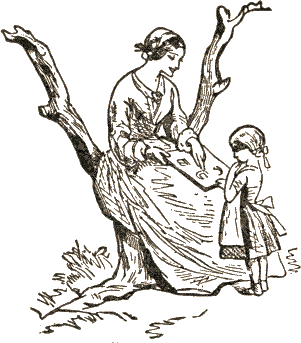
|
E, F, and G, H, I, J, K, L, M, N, O, P, Q, R, S, T, U, W, V, X, Y, and Z, And oh, dear me, When shall I learn My A, B, C. |
![]()
Milk-man, milk-man, where have you been?
In Buttermilk channel up to my chin,
I spilt my milk, and I spoilt my clothes,
And got a long icicle hung to my nose.
![]()
I like little pussy, her coat is so warm,
And if I don’t hurt her she’ll do me do harm;
So I’ll not pull her tail, nor drive her away,
But pussy and I very gently will play.
![]()
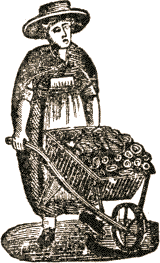
|
Sold puddings and pies, She went to the mill, And the dust flew in her eyes. While through the streets, To all she meets, She ever cries, Hot Pies — Hot Pies. |
|
An ox and a half, Forty good shillings and three. Is not that enough tocher For a shoemaker’s daughter, A bonny sweet lass With a coal-black ee? |
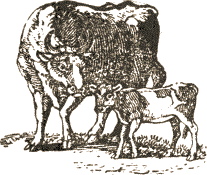
|
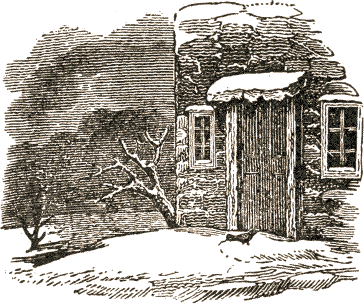
|
|
When the snow is on the ground, For the trees have no leaves, And no berries can be found. The air is cold, the worms are hid, For Robin here what can be done? Let’s strow around some crums of bread, And then he’ll live till snow is gone. |
![]()
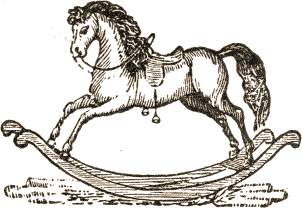
|
Told me a story How he tried Cock-horse to ride, Sword and scabbard by his side, Saddle, leaden spurs and switches, His pocket tight With cents all bright, |
|
Marbles, tops, puzzles, props, Now he’s put in jacket and breeches. |
|
![]()
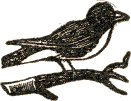
|

|
|
There were two blackbirds sitting on a hill, One name Jack, and the other name Jill; Fly away, Jack — fly away, Jill, Come again, Jack — come again, Jill. |
|
![]()
|
Willie boy, Willie boy, Where are you going? O let us go with you, This sunshiny day. |
|||
|
I’m going to the meadow, To see them a mowing, I’m going to help the girls Turn the new hay. |
|||
![]()
Wee Willie Winkie runs through the town,
Upstairs and downstairs in his night gown;
Tapping at the window, crying at the lock,
“Are the babes in their beds, for it’s now ten o’clock?”


